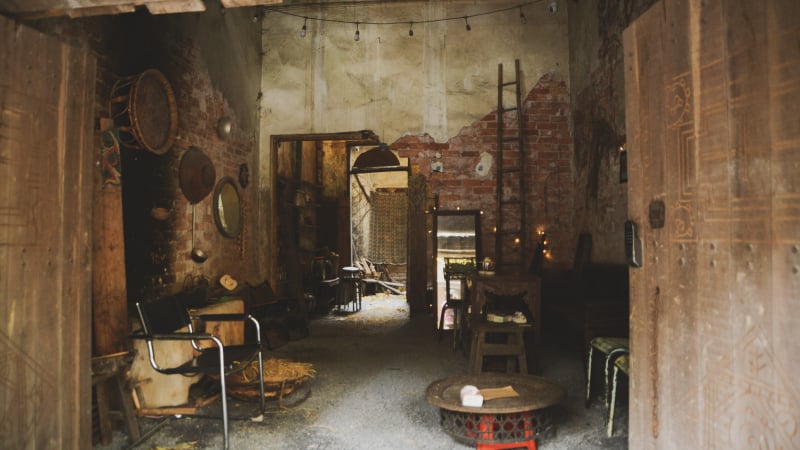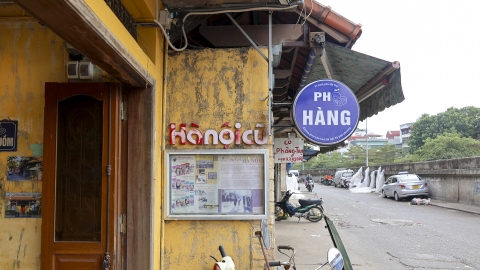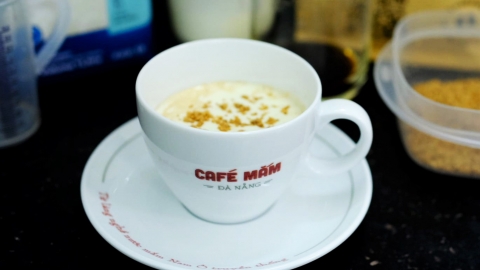The journey of the Ede boy bringing coffee beans to the city.
Initially, Y Tô Tô (born in 2000, from Dak Lak province) cycled around Hanoi selling hand-roasted Robusta coffee grown by his family in Dak Lak. After a while of selling coffee door-to-door, he began thinking about finding a more stable place to continue his story in his own way.
In 2023, UNESCO YCC Hanoi was revived from the "Bringing Forests to the City" project. By May 2025, also within the framework of this project, TôTô Café was established.

Mr. Y Toto, owner of Toto coffee shop.

TôTô Café was established at 23 Châu Long Street, in an old house over a century old.
The imprint of the Ede people inside a house over a hundred years old.
The café is housed in a building constructed in 1924, bearing the distinctive mark of Hanoi's architecture from that era. After more than a century, while many neighboring buildings have changed, 23 Chau Long Street is the only one that has retained its original appearance completely intact.
By 2022, the house was rented out and restored, retaining its old, stained, and cracked brick walls, creating an authentic backdrop that highlights the Ede artifacts displayed inside.

The interior of TôTô cafe is cozy and rustic.




The traditional Ede shirt is a cultural highlight in the restaurant's space.
The cafe's interior is decorated with many items reminiscent of the Central Highlands, from baskets and gongs to traditional Ede clothing. Most of these are family heirlooms or gifts from the Ede community. Y Tô Tô Kbuôr, the founder of the cafe, shared: "The cafe is still being refined to better reflect the spirit of the local culture."

A quiet space located at the back of the cafe.
"Three times nine" and the Ede people's way of enjoying coffee.
The core appeal of the cafe lies in its distinctive Robusta coffee flavor. The coffee beans are grown, roasted, and ground in Dak Lak, using a special processing method: hand-roasted over a wood fire according to the "oral knowledge" passed down through generations of the local people. This creates a unique smoky aroma and the scent of the red soil of the highlands that is unmistakable. "Here, I use coffee beans grown in my own garden. The bags of wood-roasted coffee are hand-packed and sent to Hanoi by my parents, still carrying the smoky aroma and the scent of the red soil of the highlands," Y To To said.

Ede coffee is introduced with the concept of "triple ripening," defining the perfection of the coffee bean: First ripening: Ripening on the tree when the fruit is bright red. Second ripening: Ripening over fire during roasting and grinding with wood. Third ripening: Ripening in water when mixed with boiling water to create the perfect flavor.
The Ede people have a custom of sharing a single cup of coffee, passing it around to enjoy, symbolizing unity and a shared ancestry. In Hanoi, cafe owners have adapted this custom by brewing coffee in ceramic pots and then pouring it into individual cups for everyone to share.

"No Wifi, No Toilet" in the heart of the old town.
Amidst the rustic old house, a handwritten sign in red paint on the wooden door easily catches the visitor's attention: "Wifi - No. Toilet - No." The lack of modern amenities isn't necessarily an intentional attempt to stand out, but rather stems from the limitations of the conservation project.
Therefore, the cafe isn't really suitable for those who want to work or need a comfortable space. But thanks to that, the space is isolated from the noisy streets. People who come here tend to stay longer, talk more, or simply quietly enjoy their signature coffee.

Toto - Seed of Aspiration
According to the owner, the name "TôTô" evokes the image of a small seed, symbolizing "seeds containing great aspirations."
For Y Tô Tô, this cafe is just the beginning. His longer-term goal is to bring Ê Đê culture to more places. “I still cherish the dream of a cultural space where Ê Đê people can tell their own stories, like Đăm Săn – 'The Epic of the Great Forest,' with an elephant museum, a light show stage, and vivid experiences.”



That dream may still be far away, but in the heart of Hanoi today, each cup of Ede coffee that Y To To pours tells a part of that "epic," simple, enduring, and brimming with love for the land and its people.

 VI
VI EN
EN






























